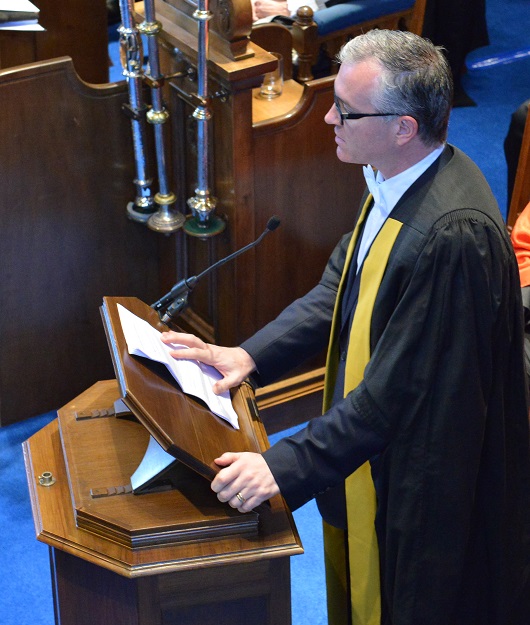Graduation address: Professor Richard English

Vice-Chancellor, ladies and gentlemen: It is an honour to have this opportunity to speak to you briefly today and to say to our most recent graduates: congratulations!
The intelligence, the disciplined hard work, and the dedication that lie behind what you have achieved at this University are hugely impressive. Like your families and friends here present today, you should be very proud of what you have done.
It is many years since I was a student. But I hope you will allow me to reflect on three important ways of taking forward with you some of the riches gained by having studied and learned at a great university such as this.
Firstly: never stop reflecting on what you learned while you were here. Put another way, never think that you have found a final answer to the kinds of difficult questions that you have addressed with such intelligence (and on which your lecturers have of course lectured you with such brilliance while you have been students at St Andrews!). The subjects on which I have myself been privileged to reflect on during my own career: why political violence and terrorism emerge; how rival nationalisms interact with each other, benignly or malignly or probably both; the incredible achievements and the very deep flaws in the activities of the modern state; the complex interaction between religious faith and political zeal – these are issues on which there simply are no final answers. So, while humbly recognising how imperfect any of our answers necessarily are, my advice would be to keep on searching hungrily for an ever-greater understanding.
Secondly: be ambitious in the scale of the ideas that you take with you, and that you reflect on through your lives. When an undergraduate myself, I became very absorbed in the work of the great historian Eric Hobsbawm, one of whose injunctions was that scholars in his field should concern themselves with what he termed ‘the transformations of human kind’.[1] This is a daunting task. But what he meant, I think, is that whatever the particular issue on which you intelligently reflect, you should think about how it relates to genuinely significant concerns and issues, to matters of enduring world significance. Put another way, this is an encouragement to avoid intellectual triviality.
Thirdly: and not unrelatedly, do not leave your books behind. I do not (necessarily) mean you to take this literally (although that too is not a bad idea). What I mean is that there are certain goods that one can only derive from extended, scholarly, deeply-researched, powerfully written attempts to develop intellectual argument and that these will in very many cases be necessarily embedded in serious books. There will (perhaps soon) come a day when the kinds of book-lined offices so common around this University will seem an eccentricity as we all instead read what we read on some superior version of our glasses (or some similarly ingenious device). And there is nothing necessarily wrong with that at all as long as one retains the commitment to thinking about things in ways that go far, far beyond what Twitter (for example) or the news feeds on the internet currently allow. There are some things which only the serious reading of extended and research-based analysis will allow you to understand. And your lives (and those of the people who matter to you) will be immeasurably enriched if you continue to engage in the areas of your own passion and interest and expertise with, to quote Eric Hobsbawm again, books which represent ‘a major work on a major topic’.[2]
So: never stop reflecting on what you have learned, be genuinely ambitious in the scale of the ideas that you carry with you and continue to be absorbed and excited by the most serious scholarly books and arguments. You have achieved so much already. I believe that you can achieve even more in your very exciting futures.
Thank you very much.
[1] E Hobsbawm, On History (London: Weidenfeld and Nicolson, 1997), p. 67.
[2] E Hobsbawm, Interesting Times: A Twentieth-Century Life (London: Penguin, 2002), p. 107.
Category University news